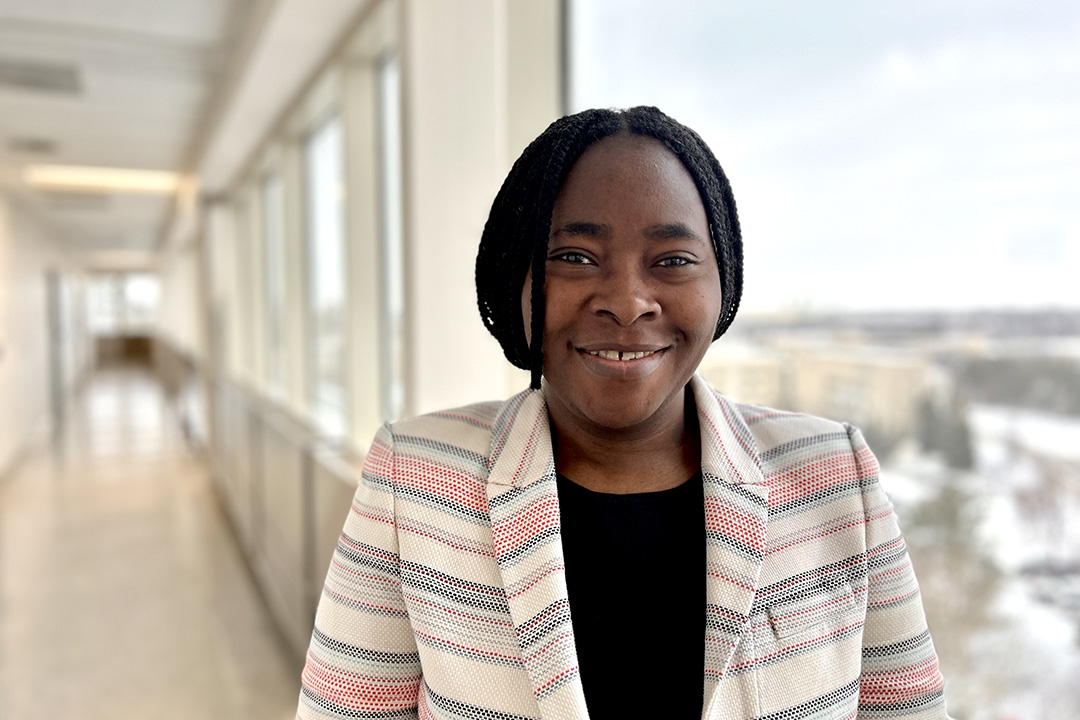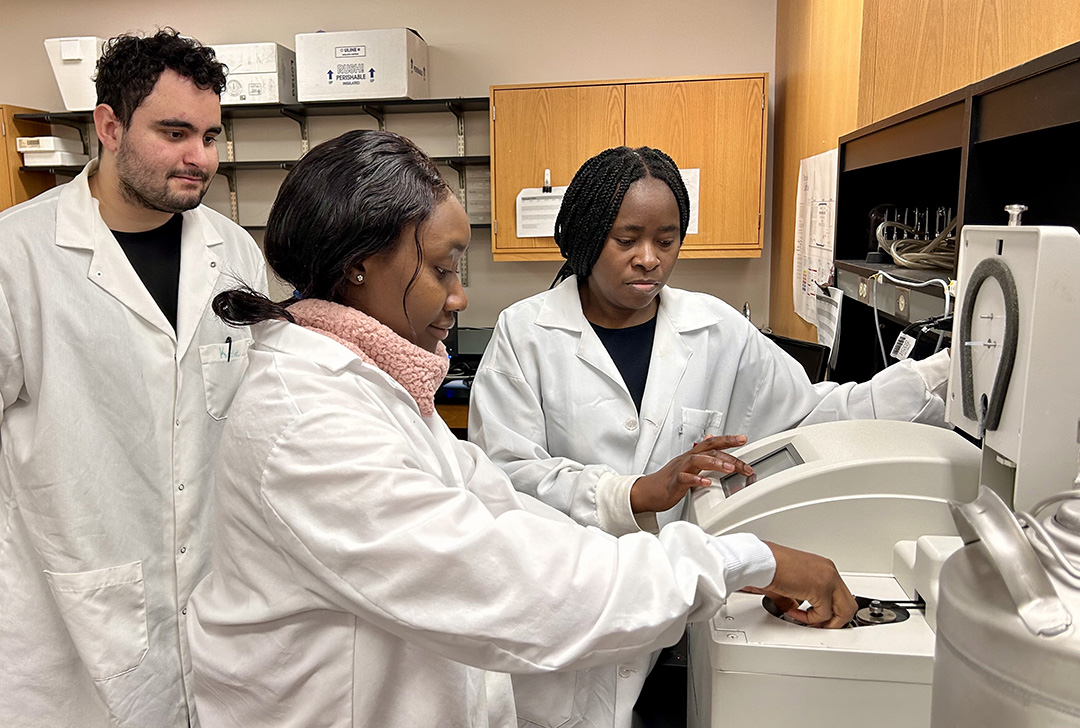
Meet Dr. Deborah Adewole: USask’s newest non-ruminant nutritionist
The animal gut, like that of humans, is home to millions of microbes that serve various functions, and the health of an animal’s gut is critical to their overall health.
By Agriculture and Bioresources CommunicationsAs a non-ruminant (single-compartment stomach) nutritionist, Dr. Deborah Adewole (PhD) is working to improve the intestinal health of poultry and swine for safe and sustainable food production.
Adewole joined the University of Saskatchewan (USask) in September 2023 and is an assistant professor in the Department of Animal and Poultry Science in the College of Agriculture and Bioresources. Prior to USask, Adewole was an assistant professor and industry research chair in the Department of Animal Science and Aquaculture at Dalhousie University.
In addition to improving food security through her research, Adewole is an advocate for African youth interested in agriculture. Adewole and her husband co-founded African Youths in Canadian Agriculture (AYCA), a Black-led non-profit organization to encourage, equip, and empower youths of African descent to pursue careers in agriculture in Canada.
As USask celebrates Black History Month in February, Adewole took time in her busy schedule to discuss her work and her passion for research.
USask: What does your research focus on?
Adewole: My research centres on nutrition, metabolism, nutrigenomics, and physiology, with the overall aim of improving production efficiency and sustainability of non-ruminant animals (poultry and swine). For the past six years, I have been developing nutritional strategies to improve the intestinal health of poultry as a strategy to sustainably reduce the use of antibiotics and minimize the development of antibiotic resistance, which is a current global issue. I am also investigating how antimicrobial usage in the poultry industry correlates with the development of antimicrobial resistance. Additionally, I am exploring novel feed ingredients as alternatives to conventional feedstuffs to reduce feed costs.
USask: How did you develop an interest in this topic?
Adewole: Nutrition and food security have been my passion for a long time. Growing up in Southwestern Nigeria, I had hands-on experience in both plant and animal agriculture. My father was a teacher who practiced farming as a side adventure, so I got to work on our farm on evenings and weekends. I became interested in contributing more to food security, particularly, looking for ways to make more meat protein available to households. Therefore, I went on to obtain a Bachelor of Agriculture degree at Obafemi Awolowo University, Ile-Ife, Nigeria. I developed interest in research, so I worked as a technologist in a teaching and research laboratory in Nigeria before I moved to the University of Manitoba. At the University of Manitoba, I obtained my master’s and PhD degrees in swine and poultry nutrition and had a period of post-doctoral fellowship in monogastric gut health.
USask: What research project are you working on?
Adewole: Currently, I am investigating biologically active substances such as plant extracts and other natural products to boost poultry and swine health when raised in the absence of antibiotics and during physiological stress. As antibiotic use continues to decline in food-animal production, animals become more prone to infectious diseases (which may affect food safety) and suffer more from environmental stress. I have developed Salmonella-reduction approaches in poultry, developed substances to serve as antibiotic alternatives, and devised different delivery strategies (including an in ovo delivery system) for easy administration of these substances.
I am also developing strategies to help animals cope with environmental stress, particularly heat stress which causes significant economic losses to industry. Poultry are mostly vulnerable to heat stress because of their poor ability to dissipate heat, resulting from the absence of sweat glands, the presence of feathers that prevents cooling, and increased metabolic rate due to selection for rapid growth.
Already, my research group has explored the impact of heat and cold stress on poultry growth performance, gastrointestinal health, and physiology of chickens. We have consistently confirmed that heat stress induces adverse effects on chickens, evidenced by altered physiological responses (reduced feed intake, increased rectal temperature, imbalanced plasma electrolytes, and altered antioxidant status), disrupted immune system (increased immunoglobulin concentrations and reduced spleen size), and impaired gut health (reduced beneficial gut bacterial population and reduced ability of the gut to absorb nutrients).

USask: Why is this research important?
Adewole: My research aims to help the poultry and swine industries remain profitable and sustainable. To meet the demand of the growing global population, more meat and eggs need to be produced. At the same time, the industry wants to produce food in ways that are ethical, environmentally sustainable, and wholesome. To balance these dynamics, strategies need to be put in place to help farmers achieve their goals.
Some of the questions that my research continues to seek answers to include: How can we make animals remain healthy and productive when there are restrictions on the use of antibiotics and changes in housing systems? How can we help animals cope with environmental stress in the face of climate change realities and reduced antibiotic use? What can we do to reduce the environmental footprint of poultry and swine production? I am currently working with two graduate students at USask and one at Dalhousie University to answer some of these critical questions.
USask: What advice would you give to students pursuing a career in science or agriculture?
Adewole: My advice would be to keep focused, work hard, and never give up. Agriculture is a noble profession.
USask: What inspires you in your work and research?
Adewole: Different categories of people inspire me: My family, my mentors, my colleagues, and my students.
USask: What are you looking forward to in your new position?
Adewole: I am looking forward to discovering more of what the world needs and equipping highly qualified personnel with expertise and knowledge the world desires, in my field.
Together, we will undertake the research the world needs. We invite you to join by supporting critical research at USask.

